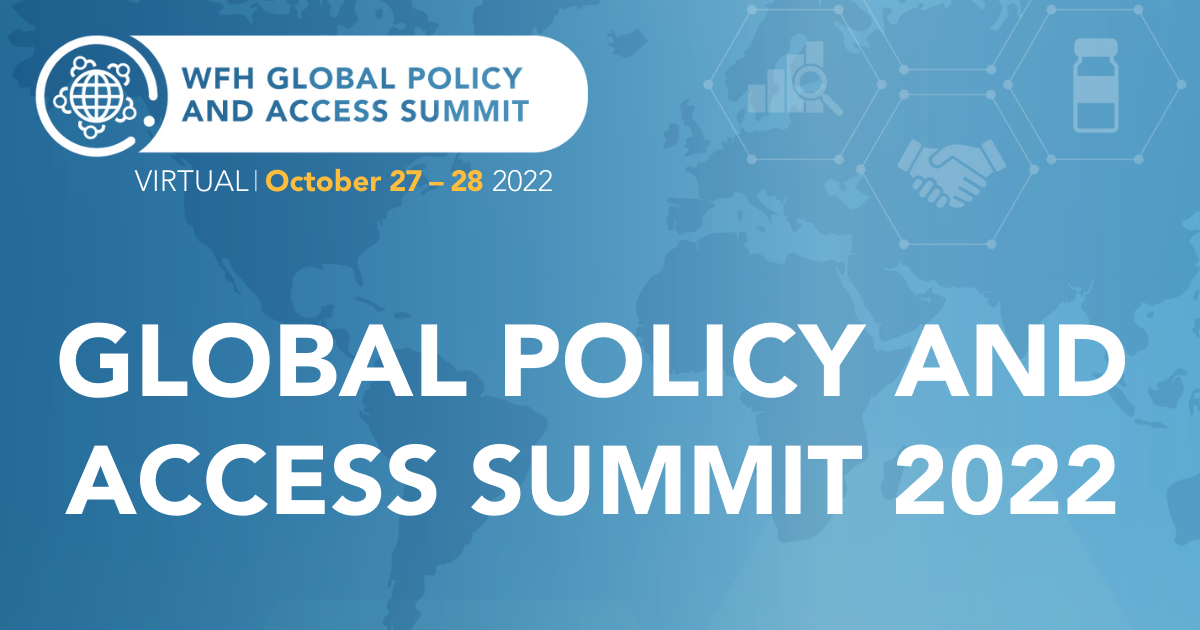
Global Policy and Access Summit 2022
The presentations and discussions of the second edition of the WFH Global Policy and Access Summit (GPAS) center around improving
Year: 2023
Language: English
Author(s): World Federation of Hemophilia
Format: Congress recordings

The presentations and discussions of the third edition of the WFH Global Policy and Access Summit (GPAS) center around increasing access to diagnosis, treatment and care for people living with bleeding disorders. These include speakers from local and international partner organizations, national government representatives, healthcare professionals, WFH NMO leaders, and bleeding disorders advocates.
The WFH does not engage in the practice of medicine and under no circumstances recommends particular treatment for specific individuals. For diagnosis or consultation on a specific medical problem, the WFH recommends that you contact your physician or local treatment centre. Before administering any products, the WFH urges patients to check dosages with a physician or hemophilia centre staff, and to consult the pharmaceutical company’s printed instructions.
The WFH does not promote any particular pharmaceutical product and any mention of any commercial brand in this presentation is strictly for educational purposes.
Join Salome Mekhuzla (Canada), Cesar Garrido (Venezuela), and Clive Ondari (Switzerland) in the opening plenary to hear about the GPAS objectives and the program highlights. Learn more about the WFH’s work in areas of improving equitable access to diagnosis, treatment and care for people with bleeding disorders, regardless of their bleeding disorder, gender and where they live.
Join Rana Saifi (Canada), Alain Baumann (Canada), Nathan Connell (United States), and Dawn Rotellini (United States) in this educational session as they highlight global disparities in identification and diagnosis, access to therapies, access to prophylaxis, and more, with a special focus on the barriers faced by people with hemophilia, von Willebrand disease and women and girls with bleeding disorders.
Our National Member Organizations (NMO) around the world are on the frontlines of advocacy for people with bleeding disorders. Join Juan Andrés Pereira de Souza (Uruguay), Latifa Lamhene (Algeria), Mohammed Soliman (Egypt), Yannick Collé (France), James Kago (Kenya), Nawal Eltayeb (Sudan), Tahani Ali (Syria), and Bill Robie (United States) in this lightning round session and hear more from our NMOs on some of the leading advocacy projects taking place in their countries to address the barriers in diagnosis and care. Get inspired as our they share their experience, lessons learned, and actionable recommendations you can implement today.
The WFH estimates that over 70% of expected people living with hemophilia worldwide have not yet been identified and diagnosed. Join Emna Gouider (Tunisia), Juliana Hagembe (Kenya), Adriana Velasquez Berumen (Switzerland), Megan Adediran (Nigeria), and Tahani Ali (Syria) in this educational session to discover key findings from the WFH NMO survey on barriers to identification and diagnosis. Learn strategies to strengthen health care systems by looking at the role of primary healthcare, national screening programs, and recommendations from the WFH guidelines on hemophilia and VWD. Finally, the discussion by our panel of experts highlights successful outreach projects which have accelerated identification and diagnosis of PWBD.
How to ensure that patient organizations have a seat at the decision-making table? Join Ekawat Suwantaroj (Thailand), Dawn Rotellini (United States), Alok Srivastava (India), and Erich Vinicius de Paula (Brazil) in this educational session to uncover concrete strategies for successful advocacy to secure sustainable government investment for bleeding disorders. Learn about the multi-prong approach to strengthening care delivery systems by looking at WFH guidelines on national organization of care and recommendations on effective care delivery, national bleeding care programs and committees, and the vital role of the NMO in advancing the process. Learn about a captivating case study from Brazil which will cover the government perspective on developing national bleeding disorder programs.
Access to current therapies varies greatly around the world. This educational session, led by Dawn Rotellini (United States), Len Valentino (United States), Brian O’Mahony (Ireland), Cedric Hermans (Belgium), and David Page (United States), begins with an overview of currently available therapies and what’s coming down the pipeline. After, an expert panel discussion addresses the challenges of increasing equitable access in the fast-changing treatment landscape. Join to learn more about developments in novel therapies and what strategies should be put in place to increase equitable access to existing and novel therapies.
Launched in 2021, the WFH Path to Access to Care and Treatment (PACT) Program is designed to improve outreach and diagnosis and increase access to sustainable care for PWBD. Where are we two years in? In this WFH highlight session, led by Salome Mekhuzla (Canada), Guada Lagrada (Canada), Juan Andrés Pereira de Souza (Uruguay), Flerida Hernandez (Philippines), Premroop Alva (India), and Abdoulaye Loum (Senegal), discover the progress made since 2021 towards achieving the PACT program goals. Learn more about the PACT Advocacy Academy 8-month long course and hear real-life stories from NMOs engaged in the PACT program as they share their outcomes and the impact of their participation on the bleeding disorders community in their country.
In this educational session, led by Courtney Thornburg (United States), Mark Skinner (United States), Donna Coffin (Canada), Victor Jiménez-Yuste (Spain), and Bradley Rayner (South Africa), learn about the SDM model and its value in enabling PWH to make informed treatment decisions alongside their healthcare team. Discover concrete examples of its successful application in other types of disease. Witness the global debut of the new WFH Shared Decision-Making tool for hemophilia. Learn how the SDM model can be applied in clinical practice.
The Closing Plenary session from the 2023 Global Policy and Access Summit features Alain Baumann (Canada) and Salome Mekhuzla (Canada).

The presentations and discussions of the second edition of the WFH Global Policy and Access Summit (GPAS) center around improving
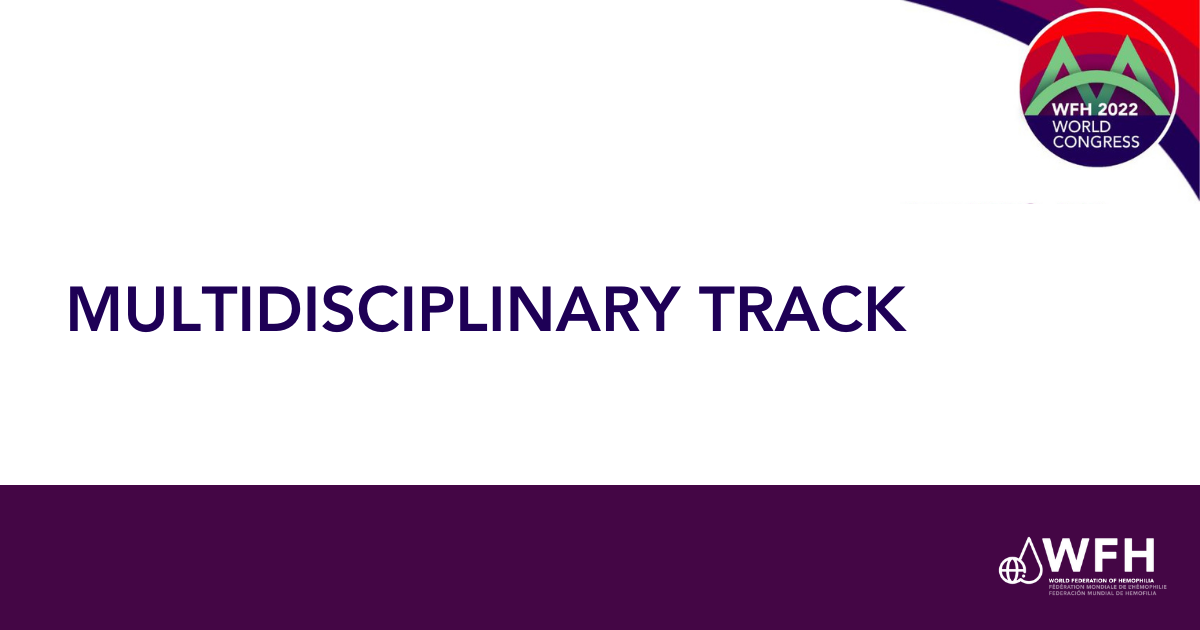
In these sessions from the WFH 2022 World Congress, listen to Kate Khair, Luke Pembroke, Louis Marlow, Andrew Selvaggi, Robert
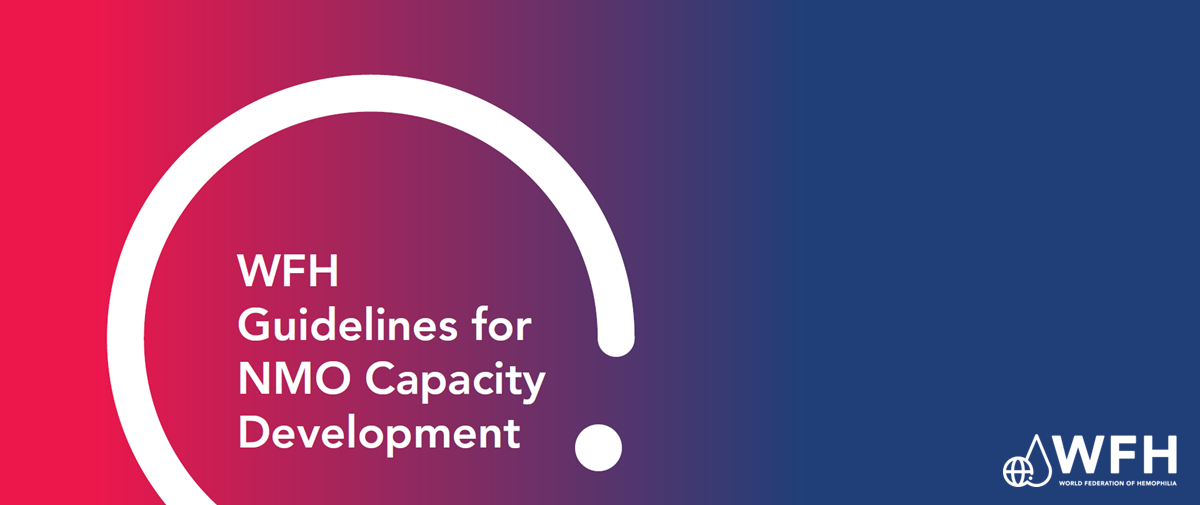
The WFH Guidelines for NMO Capacity Development were created to provide clear benchmarks and a framework for regular assessments to
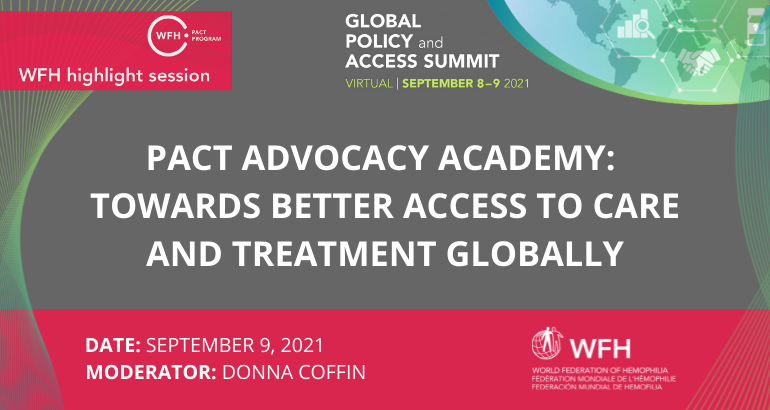
In this session from the Global Policy and Access Summit, Donna Coffin, Salome Mekhuzla, Carlos Safadi Marquez, John Gershman and
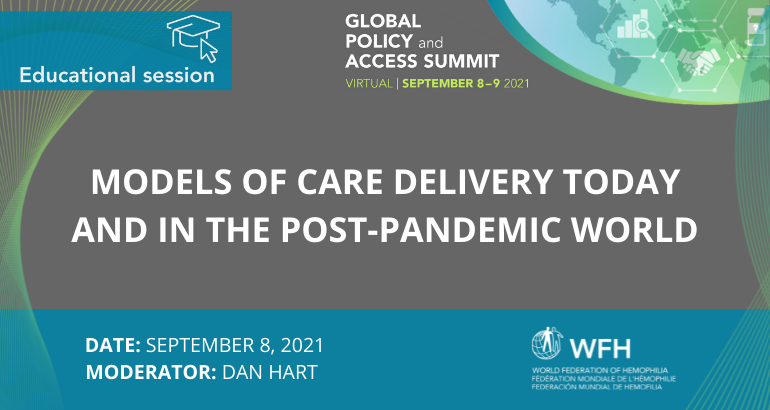
In this session from the Global Policy and Access Summit, Dan Hart, Margareth Ozelo, Hatoon Mohammed and Daniel Anibal Garcia
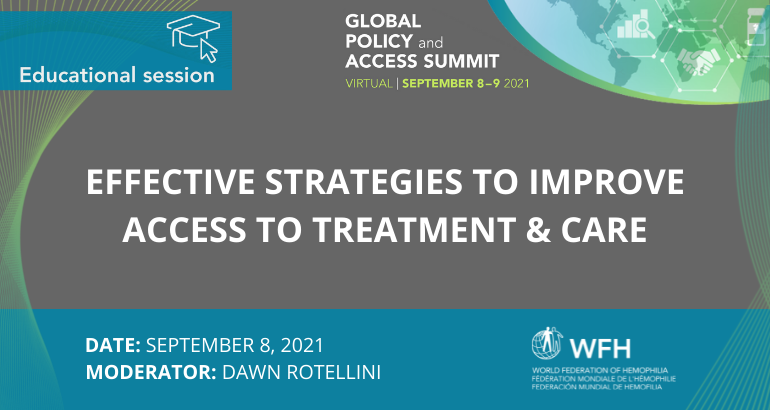
In this session from the Global Policy and Access Summit, Dawn Rotellini, Bradley Rayner, Declan Noone and Durhane Wong-Rieger, will